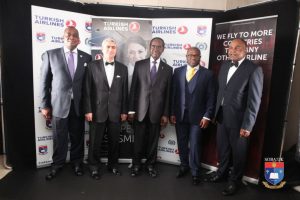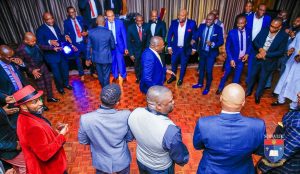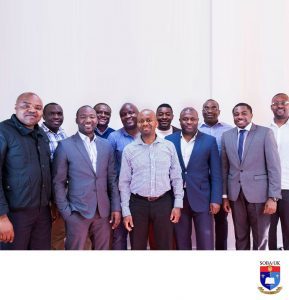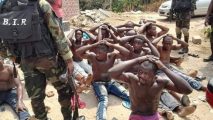17, October 2017
Philemon Yang is not a wise and trans-formative Southern Cameroons politician 0
Long ruled by a vicious, malicious and a sadist passing for a Roman Catholic , Cameroon could soon be in the hands of a military thug who may be more in tune with La Republique’s overwhelmingly young population currently hostile towards the people of Southern Cameroons for their lack of understanding of the political history and reunification agreements that were signed in 1961.
The young man in question is a Beti-Ewondo army colonel (names withheld), whose role in the killings of hundreds of Southern Cameroonians last week has been highly appreciated by many French Cameroun political elites. But few in Yaoundé now expect a swift transition without chaos.
From his Intercontinental hotel apartment in Geneva, Biya ousted the vastly more experienced Anglophone military officials from command operations including Brigadier General Elokobi Daniel Njock, General Ivo Yenwo and the newly appointed General Ekongwese all of whom have good working relations with the powerful Minister of Territorial Administration and Decentralization, Rene Sadi.
The move laid the foundation for the genocide currently going on in Southern Cameroons and ended a period of uncertainty within the Anglophone military top brass. It also raised questions about the wisdom of empowering an inexperienced army colonel so quickly when General Rene Meka is still in control.
In some ways, the decision was to assist the youthful defense minister, Joseph Beti Assomo who has been having major difficulties dealing with the old guards in the army hierarchy. Roughly 80 percent of senior French Cameroun military officers are above the age of 70 and there is no one among them who has cultivated an image as a dynamic leader, keen to take a dying nation into the modern era.
Added to this funny arrangement is what they call in La Republique “reserve generals”. These are retired army generals who are still under the government’s payroll and are still enjoying all the benefits of a senior official in the Cameroun army. They include Pierre Semengue and Tataw James.
The young Francophone colonel has pushed to increase the influence of the Rapid Intervention Battalion and the National Gendarmerie who are roaming the streets and public places of every Southern Cameroons state, counties and villages, interfering in private lives.
The killings of dozens of Southern Cameroonian citizens and the policy of militarization of the territory however, has been reckless. This policy has prompted even the moderate leadership of the outlawed Cameroon Anglophone Civil Society Consortium led by Barrister Agbor Felix Nkongho to join in resisting talks orchestrated by Prime Minister Philemon Yang and accusing Yaoundé of following an “extremist ideology”.
Biya has indeed created problems for Cameroon as a nation and for Nigeria following the influx of thousands of Southern Cameroons refugees into Ikom, Calabar and some to Lagos. The gang of young Beti-Ewondo officers now running the political show in Yaoundé have found common cause with anti Anglophone cabinet members such as the Minister of Justice, Laurent Esso who despite having Anglophone children in his first marriage with Justice Arrey gave his blessings to the genocide going on in West Cameroon, the Minister delegate in charge of the gendarmerie, Jean Baptiste Bokam, Higher Education Minister, Fame Ndongo, Communication Minister, Issa Tchiroma and Defense Minister Beti Assomo.
In addition, the young soldiers have picked an unnecessary fight with the leadership of the Roman Catholic Church in Southern Cameroons, partly because the Bishops did not cite with the Biya regime and support the crackdown like the Francophone Bishops have done.
The young soldiers and the hardliners in government have acted without thinking through the consequences. So, Biya has turn back to his Anglophone Prime Minister Philemon Yang for redress. We of the Cameroon Concord News Group think it is too little too late. Philemon Yang is not a wise and trans-formative Southern Cameroons politician. For the time being, he needs the guidance of more experienced hands, including men like Barrister Ben Muna and former governor David Aboum, whom many Southern Cameroons political elites consider their best friend in La Republique du Cameroun.
Prime Minister Philemon Yang said he was carrying a message of “peace and hope” from President Biya to the people of the Republic of Southern Cameroons. Yes Mister Prime Minister, for your information, “You do not talk peace with a friend or a brother!! You talk peace with an enemy.
By Soter Tarh Agbaw-Ebai
Cameroon Concord News Group














 Sadi Senior
Sadi Senior


















17, October 2017
Mister George nears goal of Liberia presidency 0
George Weah has been here before: on the goal line of the Liberian presidency, one run-off vote from victory. Unlike in 2005, however, his support is much wider and many expect him at last to succeed. The 1995 European football player of the year won 39 percent of votes in first round presidential polls last week, with 95 percent of votes counted. The final result is due on Wednesday. That was 10 percentage points more than closest rival Vice President Joseph Boakai, and a better score than he had in earlier contests, but short of the 50 percent needed to win.
A run-off between Weah and Boakai will be held in November. The result shows how support has grown steadily for the former AC Milan striker, who lit up television screens in Liberia in the 1990s with his mazy runs, briefly distracting fans from a 1989-2003 civil war that killed tens of thousands. Now “King George”, as his supporters call him, has to persuade the majority that he can run a country as well as he kicks a ball. His rhetoric has been light on policy so far. In an interview on Oct 8 he spoke vaguely about a need for better roads. “We will seek a government of inclusion where everyone can work together and make our country a better one for all of us,” he told Reuters.
Weah grew up in Clara Town slum in the capital Monrovia, playing football there and in Cameroon, where manager Arsene Wenger spotted him and took him to Monaco. He went on to play for Milan and Paris St Germain, and later in his career for Chelsea, Manchester City and Marseille. He became the first non-European to win the Ballon d’Or in 1995, the same year he picked up the African and world player of the year awards. His rags-to-riches story has inspired supporters from similarly lowly backgrounds. “Weah is grass roots, a son of the soil – he is a star, but he has the country at heart,” said Oliver Myers, an unemployed 39-year-old from the Rehab neighbourhood outside Monrovia.
Others are wary of his lack of political experience and education, and question his ability to govern a country that remains 12th from bottom of the U.N. Human Development Index. “Weah’s populism and inability to articulate a coherent platform … are deeply concerning,” said Liberian political analyst Robtel Neajai Pailey in a recent opinion piece for Liberian website The Bush Chicken. “Success at football does not translate into success in the presidency of a traumatized, poorly managed, post-war nation.”
“THERE FOR US” Doubts over Weah’s experience could still sink his ambitions in next month’s run-off, as in 2005, when he won the first round but lost the second to Ellen Johnson Sirleaf, the Nobel Peace Prize winner who went on to rule for 12 years. Weah refused to take part in televised debates attended by most other major candidates, and his choice of running mate Jewel Howard-Taylor – ex-wife of Charles Taylor, the former president and warlord serving 50 years in Britain for war crimes in neighbouring Sierra Leone – has raised eyebrows.
Johnson Sirleaf was credited with shoring up peace after the civil war, but criticised for failing to tackle elite graft and doing little to lift most Liberians out of poverty. Development has been hindered by an Ebola outbreak and a drop in the price of iron ore. Poor roads still leave most of rural Liberia stranded during the rainy season, often without electricity. In Monrovia, where derelict buildings line the main highways, most live on pitted dirt streets with little access to clean water. Boakai, 72, Sirleaf’s deputy for 12 years, has struggled to separate himself from her during his campaign, despite promoting his humble beginnings.
As Weah gained popularity, he was elected to the Liberian senate in 2014, defeating the president’s son Robert Sirleaf. He still plays football every Sunday in Monrovia. “While people have reservations about his lack of education, he is seen as the candidate for change,” a diplomat told Reuters on Monday. “It will take a lot for Boakai to turn this one around.” Thomas Kojo, who played with Weah on the Liberia national team, thinks his former teammate’s passion for his country will take him far. “The heart George has for Liberia is unbelievable,” Kojo said in an interview outside Weah’s compound in Rehab on Monday. “He made sure the national team was always trying to bring (home) some pride.”
Weah paid for the national team’s kit when the Football Association couldn’t afford it during the war, and gave players up to $600 spending money and similar bonuses if the team won, Kojo said. He once chartered a flight for the team when they were stranded in Ivory Coast without a flight to a game. “The football team was the only good image to come from Liberia when all people saw was the killing,” Kojo said. “He made sure he was there for us.”
Source: Euronews